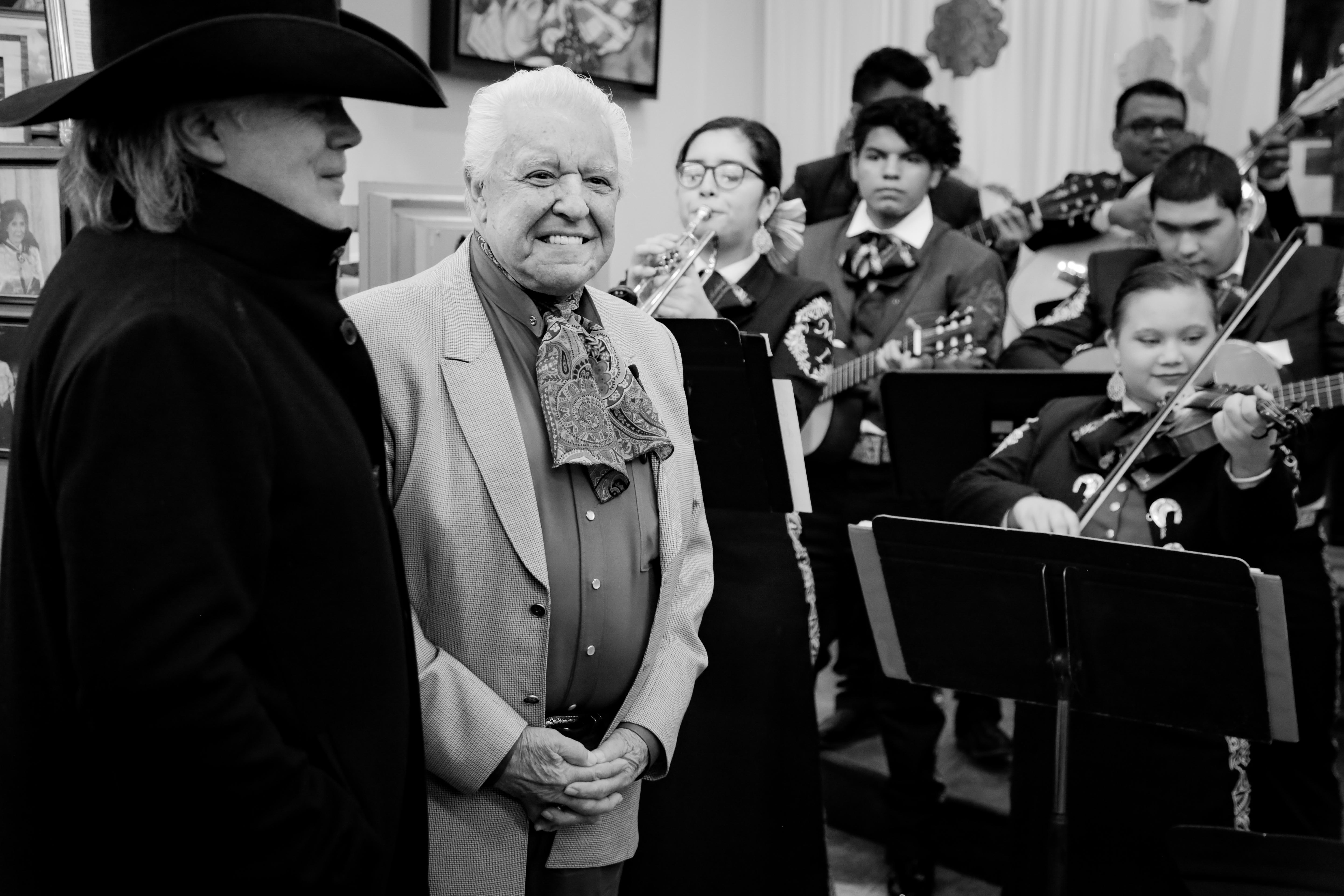Nashville’s Manuel Awarded NEA Heritage Award

By Dr. Bradley A. Hanson –
Today the National Endowment for the Arts (NEA) is announcing the newest recipients of the NEA National Heritage Fellowships, which includes Nashville’s Manuel Cuevas, a world-renowned designer of cowboy couture.
Watch Manuel receive the news of his award.
From his early life in Michoacán, Mexico, to his training in midcentury Hollywood, to his residency as a creative luminary in Nashville, clothing designer Manuel has measured, cut, and stitched a brilliant and indelible legacy in American culture.
Born in 1933, Manuel learned to sew at age seven from his older brother. By fourteen, he was a popular creator of prom dresses in his hometown in western Mexico. To sew, Manuel believed, had been born to him. In 1952, he migrated to Hollywood, where influential clothiers took notice. Manuel soon worked with celebrated designers Sy Devore, Viola Grae, and rodeo tailor Nathan Turk, whose spectacular, glittering Rose Parade costuming sparked in Manuel new inspiration.
Manuel eventually became lead tailor for Nudie Cohn, the exuberant designer most identified with the rhinestone-adorned and elaborately embroidered suits that were indispensable for County and Western stars like Tex Williams and Porter Wagoner. With Nudie, Manuel clothed everyone from Elvis Presley to Johnny Cash, James Dean to John Wayne. In 1975, Manuel launched his own Los Angeles store, serving clients including Dolly Parton, Emmylou Harris, Neil Young, and Glen Campbell.
Manuel, like Cohn, has worked most prominently in Western wear, a complex genre that, though identified with Anglo America, has multiethnic origins in Native American, Central American, and Eastern European cultures. While Manuel’s work inhabited this form, he elaborated on its tangled lines of descent. Deeply Mexican in its prehistory, the cowboy image and iconography, shaped by Manuel, seemed to reaffirm yet remaster rich Hispanic sensibilities. Many have noted in his designs the renewed bravado of the Mariachi’s trajes de charro, or on a deeper level, the patterns and palettes of indigenous Mexican textiles and furniture painting.
To Manuel, these influences were mostly subconscious. His vital contribution, whether through cultural or personal sensitivities, was guiding the cowboy aesthetic toward increasingly modern, emotional, and individualistic modes. In Manuel’s work, the subject, while still heroic, achieved a more mature dimension. His most iconic work often evokes complicated, moody masculinity. Cash, Marty Stuart, Dwight Yoakum, Jack White, and countless others credit Manuel for discovering and forging the tangible essence of their public identities.
In 1988, Manuel moved to Nashville, where he remains a marquee brand name. His clothes have earned exhibitions at the Frist Art Museum, the Johnny Cash Museum, and are displayed extensively at the Country Music Hall of Fame. He has been given lifetime achievement awards from Nashville and Los Angeles and has been recognized by the Country Music Association and Cody High Style. Now in his eighth decade of design, Manuel works in his shop nearly every day, fashioning singular new creations that, he says, he continues to discover at night in his dreams.
The NEA National Heritage Fellowships, awarded annually by the National Endowment for the Arts, highlight the breadth and excellence of the artistic traditions found in communities all across the United States. The 2018 recipients will receive a $25,000 award and be honored in Washington, DC at an awards ceremony on September 26, 2018 and at a free concert on September 28, 2018. The concert will be streamed live at arts.gov.
“The 2018 NEA National Heritage Fellows have dedicated their lives to mastering these distinctive art forms and sharing them with new audiences both within their communities and nationwide,” said Mary Anne Carter, acting chairman for the National Endowment for the Arts. “We look forward to celebrating them and their incredible artistic accomplishments this fall.”
In addition to their artistic value, each of the Heritage Fellows’ art forms also reflects the community they come from and the history of the tradition, whether it’s a material art form—such as Manuel’s iconic suits and the patterns of Feryal Abbasi-Ghnaim’s embroidery—or a musical art form—such as Don and Cindy Roy’s Franco-American music. These artistic traditions and the stories behind them will be shared at two events in Washington, DC, both of which are free and open to the public.

